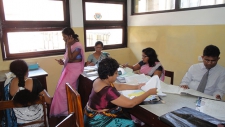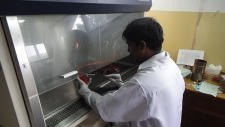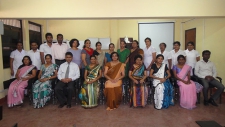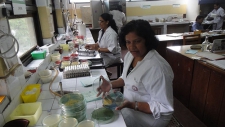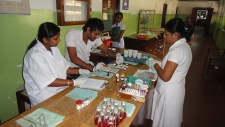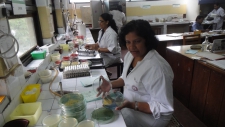History
Department of microbiology at NHSL was established in 1970s by two Consultant Pathologists Dr. Doris Peiris and Dr. H.R. Wickramasinghe. In 1981 Dr. S.D. Athukorala was appointed as the first permanent Consultant Clinical Bacteriologist to the department of microbiology. On his retirement in mid 2005 Dr. Mrs. Philomina Chandrasiri was appointed as the second Consultant Microbiologist and she served till early 2013.
The infection control unit was established in 1987 under the leadership of Dr. S.D. Athukorala, Consultant Clinical Bacteriologist and Mrs. Chandra Gunawathie was the first Infection Control Nursing Officer appointed to the infection control unit.
The department of microbiology and infection control is a well recognized unit in Sri Lanka
Services
It is well equipped to provide microbiology culture, direct microscopy and antibiotic susceptibility testing in microbiological samples namely blood and all sterile fluids namely cerbro-spinal fluid, peritoneal fluid, pleural fluid, aspirates from sterile sites, heart valves, pus aspirates, respiratory samples, urine, faeces, throat swabs, wound cultures, tissue biopsy samples, screening and surveillance cultures as appropriate according to standardized and quality controlled methodology.
The department participates in the External Quality Assessment (EQA) programmes conducted by the Medical Research Institute and the NPTCCD (National Programme for Tuberculosis and Chest Diseases)
Department is an approved training centre for both undergraduates from the faculty of medicine and post graduate trainee medical officers in different disciplines including clinical microbiology. It is an approved training centre for medical laboratory technologists too.
Department conducts research in relation to medical microbiology and infection control aspects as a single centre and also in collaboration with other institutes and some of them have been published and presented in local and international gatherings.
Department of microbiology works closely with the infection control unit of the hospital which too is headed by the Consultant Clinical Microbiologist as the technical head of the unit.
Present Team
Microbiology team
The team included dedicated group of staff members from medical, technical and support staff who give tireless service in order to issue timely and quality microbiology reports for better patient care.
They provide a vital service in clinical care for the battle against infections.
Team is headed by the Consultant Clinical Microbiologist, Dr (Mrs) Geethika Patabendige.
Medical staff in the department of microbiology includes Senior Registrars, Registrars undergoing clinical training in medical microbiology and other disciplines on rotational basis and four Medical Officers in microbiology.
The technical team includes Senior Medical Laboratory Technologist and eleven Medical Laboratory Technologists.
Support staff includes two orderlies and five assistant staff members.
Infection control unit team:
The team included dedicated group of staff members from medical, nursing and support staff who play a vital role in providing the patients and staff members with safer healthcare.
Infection control unit team includes Dr. Geethika Patabendige, Consultant Clinical Microbiologist as the head of the department, two infection control medical officers, Infection Control Nursing Sister and thirteen Infection Control Nursing Officers and one support staff member.
Tasks
Microbiology
Timely issuing of technically and clinically validated microbiology reports
The department of microbiology processes around 16,000 to 20,000 blood cultures, 6,400 sterile fluid cultures, 30,000 urine cultures, 21,000 pus cultures, 12,000 respiratory sample cultures, 3,000 surveillance cultures, 50,000 antibiotic susceptibility testing and 10,000 smears for Acid Fast Bacilli ( AFB) annually. To carry out the above tasks microscopy, plating on culture media, broth inoculations and biochemical testing have to be carried out. Twenty four thousand Gram stains, 90,000 plating on culture media, 20,000 broth inoculations and 30,000 biochemical testings’ including rapid manual identifications are done annually at the department of microbiology.
Providing advice on collection and transport of microbiological specimens and suggesting further testing when required
Providing antimicrobial ad infection control advice to all ICUs, HDUs, wards and units
Authorization of antimicrobial agents as required
Attending to referrals for antimicrobial and infection control advice from all specialized areas namely general medicine and surgery, orthopaedic surgery, cardiology, urology, GU surgery, cardiothoracic surgery, emergency care and accident service, neurosurgery, neurology, dialysis and transplantation.
Sending appropriate samples and isolates for reference testing to Medical Research Institute and NPTCCD reference laboratory for Tuberculosis culture and automated PCR (GeneXpert)
Undergraduate and post graduate training and other training as required
Evaluation of consumables and equipment for registration and for tenders which are submitted by the CDDA and SPC
Being resource persons in educational workshops
Representing committees related to microbiology at the Ministry of Health
Infection control
General infection control activities at NHSL and outside whenever necessary
Specialized infection control activities such as theatre commissioning, recommissioning and designing and expert microbiological advice on designing specialized and other units at NHSL and outside whenever necessary
Healthcare associated infections (HAI) surveillance
Training staff and patients
Conducting infection control audits and related research
Accidental exposure reporting and management
Vaccination of patients and staff members
Epidemiological services – notification, dengue e. surveillance, dengue sentinel site surveillance, ILI surveillance, AFP surveillance
Outbreak detection and management
Representing National advisory committee on infection control at the Ministry of Health
How to Obtain the Services
In order to obtain services from the department of microbiology and infection control contact over the telephone on 0112691111 extension 2473. 2474, 2923 and 2647
Future plans
Expanding the microbiological services to include mycological and molecular biological services with the provision of necessary resources through the ministry of health and other funding institutes.
Establishing a better laboratory information system and networking so that the units would be able to access the results with minimum delay
Obtaining laboratory accreditation to the microbiology laboratory
Further improving the infection control services to safeguard the lives of patients and staff members
Microbiology
Infection Control






